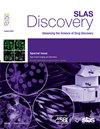The development of a novel high-throughput membrane potential assay and a solid-supported membrane (SSM)-based electrophysiological assay to study the pharmacological inhibition of GLUT9/SLC2A9 isoforms in a drug discovery program
IF 2.7
4区 生物学
Q2 BIOCHEMICAL RESEARCH METHODS
引用次数: 0
Abstract
GLUT9/SLC2A9 is a urate transporter and takes a fundamental role in the maintenance of normal serum urate levels. GLUT9 is the sole transporter of reabsorbed urate from renal epithelial cells to blood, thus making it an ideal pharmacological target for the development of urate-lowering drugs. None of the three currently available assays for studying GLUT9 pharmacological inhibition can support a high throughput drug discovery screening campaign. In this manuscript we present two novel assay technologies which can be used in a drug discovery screening cascade for GLUT9: a GLUT9 membrane potential assay for primary screening; and a solid-supported membrane (SSM)-based supported electrophysiological assay for secondary screening.
开发新型高通量膜电位测定法和基于固体支撑膜(SSM)的电生理学测定法,以研究药物发现计划中对 GLUT9/SLC2A9 同工酶的药理抑制。
GLUT9/SLC2A9 是一种尿酸盐转运体,在维持血清尿酸盐正常水平方面发挥着重要作用。GLUT9 是将肾上皮细胞重吸收的尿酸盐转运到血液中的唯一转运体,因此是开发降尿酸药物的理想药理靶点。目前用于研究 GLUT9 药理抑制的三种检测方法都无法支持高通量药物筛选活动。在本手稿中,我们介绍了两种可用于 GLUT9 药物发现筛选级联的新型检测技术:一种是用于初筛的 GLUT9 膜电位检测法;另一种是用于复筛的基于固体支撑膜 (SSM) 的支撑电生理学检测法。
本文章由计算机程序翻译,如有差异,请以英文原文为准。
求助全文
约1分钟内获得全文
求助全文
来源期刊

SLAS Discovery
Chemistry-Analytical Chemistry
CiteScore
7.00
自引率
3.20%
发文量
58
审稿时长
39 days
期刊介绍:
Advancing Life Sciences R&D: SLAS Discovery reports how scientists develop and utilize novel technologies and/or approaches to provide and characterize chemical and biological tools to understand and treat human disease.
SLAS Discovery is a peer-reviewed journal that publishes scientific reports that enable and improve target validation, evaluate current drug discovery technologies, provide novel research tools, and incorporate research approaches that enhance depth of knowledge and drug discovery success.
SLAS Discovery emphasizes scientific and technical advances in target identification/validation (including chemical probes, RNA silencing, gene editing technologies); biomarker discovery; assay development; virtual, medium- or high-throughput screening (biochemical and biological, biophysical, phenotypic, toxicological, ADME); lead generation/optimization; chemical biology; and informatics (data analysis, image analysis, statistics, bio- and chemo-informatics). Review articles on target biology, new paradigms in drug discovery and advances in drug discovery technologies.
SLAS Discovery is of particular interest to those involved in analytical chemistry, applied microbiology, automation, biochemistry, bioengineering, biomedical optics, biotechnology, bioinformatics, cell biology, DNA science and technology, genetics, information technology, medicinal chemistry, molecular biology, natural products chemistry, organic chemistry, pharmacology, spectroscopy, and toxicology.
SLAS Discovery is a member of the Committee on Publication Ethics (COPE) and was published previously (1996-2016) as the Journal of Biomolecular Screening (JBS).
 求助内容:
求助内容: 应助结果提醒方式:
应助结果提醒方式:


